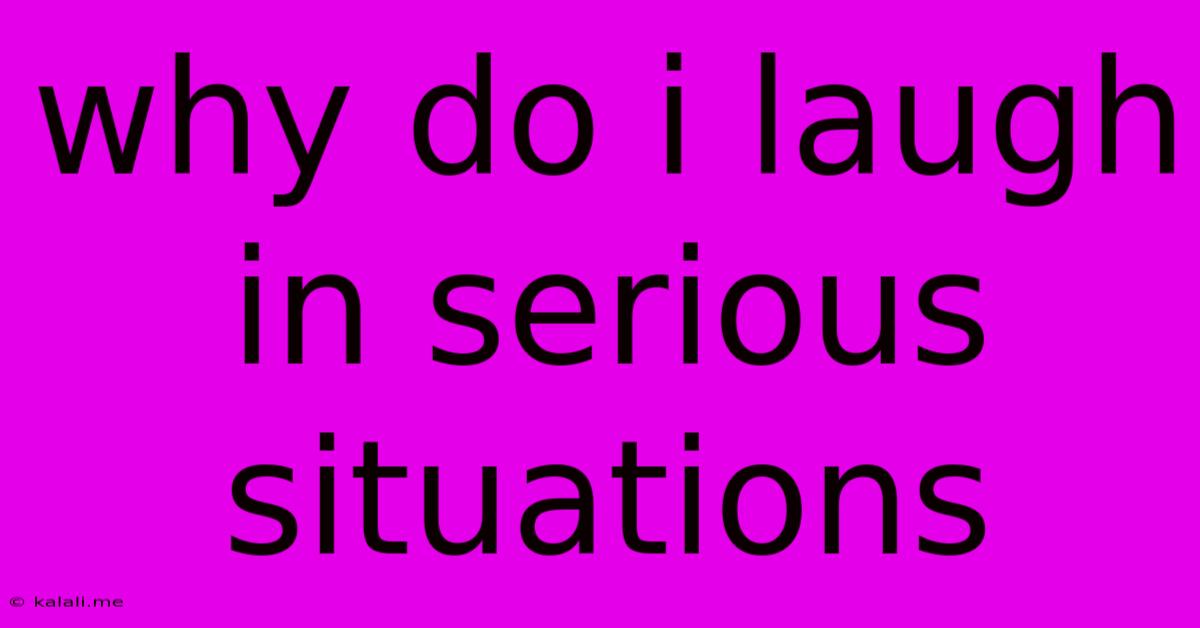Why Do I Laugh In Serious Situations
Kalali
May 20, 2025 · 3 min read

Table of Contents
Why Do I Laugh in Serious Situations? Understanding Inappropriate Laughter
Laughing in serious situations can be confusing, embarrassing, and even frustrating. It's a common experience, yet understanding why it happens can offer valuable self-awareness and potentially improve social interactions. This article explores the various reasons behind this seemingly inappropriate reaction, offering insights into the psychology behind laughter and providing strategies for managing it.
What causes inappropriate laughter? It's not a sign of insensitivity; it's a complex neurological and psychological phenomenon with multiple contributing factors.
1. Nervous Laughter: A Defense Mechanism
This is perhaps the most frequent cause. Nervous laughter, also known as anxiety laughter, is a coping mechanism triggered by stress, discomfort, or fear. The brain, overwhelmed by intense emotions, releases laughter as a way to diffuse the tension. It's a subconscious attempt to alleviate anxiety, even if the situation is far from humorous. Think of it as a physiological response similar to sweating or trembling – a physical manifestation of stress. The laughter itself might feel involuntary and even unsettling to the person experiencing it.
2. Dissociation: A Mental Disconnect
In highly stressful or traumatic situations, some individuals experience dissociation, a mental detachment from reality. This can manifest as inappropriate laughter as a way of emotionally distancing oneself from the overwhelming feelings. This is a complex psychological process and often indicates a need for professional support. It's crucial to distinguish between nervous laughter and dissociation; the latter often involves a more profound emotional disconnect.
3. Awkwardness and Social Anxiety: Navigating Uncomfortable Situations
Sometimes, laughter arises from sheer awkwardness or social anxiety. Facing uncomfortable situations, particularly those involving conflict or confrontation, can lead to nervous laughter as a way to break the tension or mask discomfort. This isn't necessarily a sign of a lack of empathy, but rather a manifestation of social anxiety and difficulty managing intense emotions in social settings. This is closely tied to the concept of social awkwardness and its associated feelings of unease.
4. The Unexpected: The Absurdity of the Situation
In some cases, laughter might be triggered by the sheer absurdity or irony of a situation. The juxtaposition of a serious event with something unexpected or incongruous can lead to an involuntary chuckle. This isn't necessarily a lack of respect but a reaction to the unexpected comedic element within a somber context. Consider it a form of dark humor or finding humor in the unexpected twist of events.
5. Coping Mechanism: Dealing with Intense Emotions
Laughter can be a powerful coping mechanism for dealing with overwhelming emotions. Similar to nervous laughter, it helps regulate emotional intensity and manage stressful situations. It's a way of processing difficult experiences, even if the outward expression seems inappropriate given the context. This relates to the broader concept of emotional regulation and its challenges.
Managing Inappropriate Laughter
While inappropriate laughter is often involuntary, strategies exist to manage it:
- Mindfulness and Self-Awareness: Paying attention to your emotional state and triggers can help you anticipate and manage laughter in stressful situations.
- Deep Breathing Exercises: Deep breathing techniques can help regulate your nervous system and reduce anxiety.
- Cognitive Restructuring: Challenging negative thoughts and reframing the situation can help manage anxiety.
- Professional Help: If inappropriate laughter is frequent and distressing, seeking professional help from a therapist or counselor is recommended.
Understanding the reasons behind inappropriate laughter is crucial for self-compassion and developing effective coping mechanisms. It’s rarely a reflection of a lack of empathy, but rather a complex interplay of psychological and neurological processes. Recognizing these underlying factors can help individuals manage this challenging experience.
Latest Posts
Latest Posts
-
Which Poem Are These Lines From
May 20, 2025
-
Loud Noise When Flushing Upstairs Toilet
May 20, 2025
-
How To Forward A Group Of Emails In Gmail
May 20, 2025
-
How To Tell If Something Is Stainless Steel
May 20, 2025
-
Internal Temp Of A Cooked Ham
May 20, 2025
Related Post
Thank you for visiting our website which covers about Why Do I Laugh In Serious Situations . We hope the information provided has been useful to you. Feel free to contact us if you have any questions or need further assistance. See you next time and don't miss to bookmark.